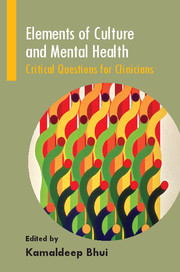Book contents
- Frontmatter
- Contents
- List of contributors
- Foreword: Desire and commitment: essential ingredients in learning about culture and mental illness
- 1 Is trauma-focused therapy helpful for survivors of war and conflict?
- 2 Will ethnopsychopharmacology lead to changes in clinical practice?
- 3 Does cognitive–behavioural therapy work for people with very different cultural orientations and backgrounds?
- 4 Can you do meaningful cognitive–behavioural therapy through an interpreter?
- 5 Are particular psychotherapeutic orientations indicated with specific ethnic minority groups?
- 6 Can psychotherapeutic interventions overcome epistemic difference?
- 7 On the role of culture and difference in evaluation, assessment and diagnosis
- 8 Necessary and sufficient competencies for intercultural work
- 9 On the validity and usefulness of existing Eurocentric diagnostic categories
- 10 Benefits and limitations of the cultural formulation in intercultural work
- 11 Barriers to the intercultural therapeutic relationship and how to overcome them
- 12 How does intercultural interpretation work in the mental health setting?
- 13 Do the power relations inherent in medical systems help or hinder in cross-cultural psychiatry?
- 14 Recovery and well-being: a paradigm for care
- 15 Social perspectives on diagnosis
- 16 Public mental health and inequalities
- 17 Can you do psychotherapy through an interpreter?
- 18 Can race and racism be acknowledged in the transference without it becoming a source of therapeutic impasse?
- 19 Cultural competence: models, measures and movements
- 20 Religion, spirituality and mental health
- Index
1 - Is trauma-focused therapy helpful for survivors of war and conflict?
Published online by Cambridge University Press: 01 January 2018
- Frontmatter
- Contents
- List of contributors
- Foreword: Desire and commitment: essential ingredients in learning about culture and mental illness
- 1 Is trauma-focused therapy helpful for survivors of war and conflict?
- 2 Will ethnopsychopharmacology lead to changes in clinical practice?
- 3 Does cognitive–behavioural therapy work for people with very different cultural orientations and backgrounds?
- 4 Can you do meaningful cognitive–behavioural therapy through an interpreter?
- 5 Are particular psychotherapeutic orientations indicated with specific ethnic minority groups?
- 6 Can psychotherapeutic interventions overcome epistemic difference?
- 7 On the role of culture and difference in evaluation, assessment and diagnosis
- 8 Necessary and sufficient competencies for intercultural work
- 9 On the validity and usefulness of existing Eurocentric diagnostic categories
- 10 Benefits and limitations of the cultural formulation in intercultural work
- 11 Barriers to the intercultural therapeutic relationship and how to overcome them
- 12 How does intercultural interpretation work in the mental health setting?
- 13 Do the power relations inherent in medical systems help or hinder in cross-cultural psychiatry?
- 14 Recovery and well-being: a paradigm for care
- 15 Social perspectives on diagnosis
- 16 Public mental health and inequalities
- 17 Can you do psychotherapy through an interpreter?
- 18 Can race and racism be acknowledged in the transference without it becoming a source of therapeutic impasse?
- 19 Cultural competence: models, measures and movements
- 20 Religion, spirituality and mental health
- Index
Summary
Few would argue that war and conflict do not affect those involved, either at the time or afterwards. The useful question to consider is: what are their psychological effects and what are the most appropriate paradigms and descriptors to use for these effects that will be both meaningful and useful to survivors wherever they may be living?
People affected by war and conflict often face a whole series of challenges. In addition to dangers to life and limb, there may be loss of family members, loss of financial security and personal safety, loss of property and of livelihood; there may also be existential losses such as hopes and plans for the future. That war can cause psychological distress appears incontrovertible, but whether this is best described within a narrowly individualistic, medicalised psychiatric framework and symbolised by a diagnosis of post-traumatic stress disorder (PTSD), or within a wider framework that accounts for practical and human loss and distress at the individual and community level is contested in the literature (for a full review of this debate see Bracken & Petty, 1998; Summerfield, 1999; Yule, 1999; Rousseau & Measham, 2007).
Concepts of trauma and traumatisation ar e, of course, broader than just PTSD but this term has been widely and sometimes uncritically used in relation to war and conflict. The word trauma has been used to explain both an event such as war and a reaction to it, perhaps erroneously linking cause and effect in a rather less complicated way than is found in reality. So the language and descriptors have not always been as accurate as they might be, perhaps adding to confusion about ways of working with individuals or communities after the event and sometimes leading to an overmedicalised discourse. Some believe that war and conflict can traumatise entire communities, whereas others believe that very few people actually develop symptoms that would lead to a diagnosis of PTSD (Summerfield, 1999). Bracken (1998) and Summerfield (1999) have noted the difficulties associated with the concept of PTSD, which include the unquestioning use of a Western world view and the imposition of this in what might be viewed as a patronising manner.
- Type
- Chapter
- Information
- Elements of Culture and Mental HealthCritical Questions for Clinicians, pp. 1 - 6Publisher: Royal College of PsychiatristsPrint publication year: 2013



